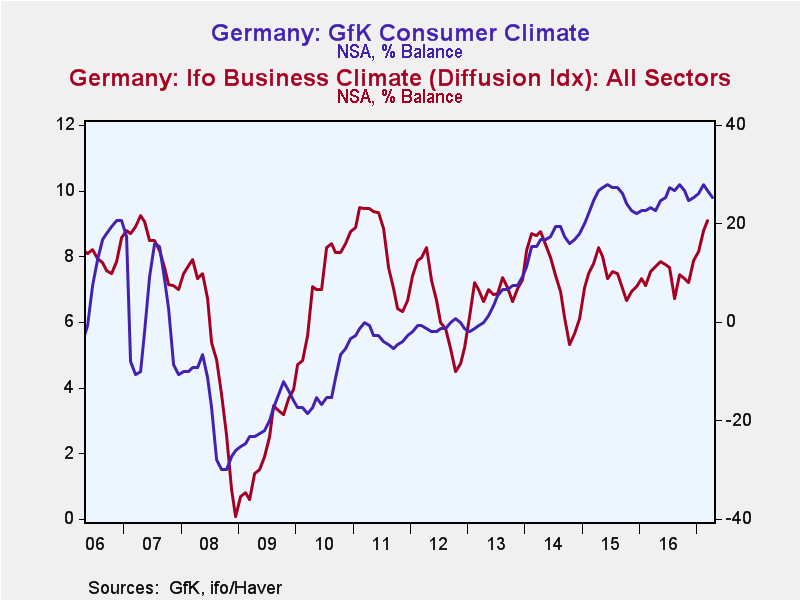 Global| Apr 24 2017
Global| Apr 24 2017IFO Business Climate Improves; Current Situation Expands Solidly While Expectations Take a Step Back
Summary
The German IFO diffusion index signaled improved climate in April with an index that rose to 18.5 from 17.5 in March. The business situation improved to a net reading of 30.3 this month from 27.2 in March as current conditions in [...]
 The German IFO diffusion index signaled improved climate in April with an index that rose to 18.5 from 17.5 in March. The business situation improved to a net reading of 30.3 this month from 27.2 in March as current conditions in Germany continued to trend higher. But expectations were lower, dropping to a net reading of 7.2 from March's 8.3.
The German IFO diffusion index signaled improved climate in April with an index that rose to 18.5 from 17.5 in March. The business situation improved to a net reading of 30.3 this month from 27.2 in March as current conditions in Germany continued to trend higher. But expectations were lower, dropping to a net reading of 7.2 from March's 8.3.
The rankings of all the indexes are strong all are in the 90th percentile range except two and all the readings in the 90th percentile range rise above a level of 95- extremely uniform and strong readings. The weakest sector reading is for manufacturing and that has for a standing in its 89th percentile- hardly weak! Despite all this strength, expectations are somewhat less ebullient with a still very solid 80th percentile standing.
On the month all the sector indexes improved except manufacturing (expectations also backtracked). The retailing sector has only jumped by more month-to-month 26 times in the last 26 years or so or 8.6% of the time. The construction sector gain this month also was relatively strong as its month-to-month change has been greater only about 15% of the time.
The IFO index shows amazingly strong and balanced readings across German goods and services industries. This performance is atypical for EMU members and it firmly establishes Germany as the best performing economy in the EMU.
The French elections have gone by the critical first round that everyone so feared. While the election result is not established, the expectations for the runoff election are now pretty clear and less daunting that they might have been. But there will be other election hurdles in EMU countries. Germany has its own to go over. But it now appears that election worries are mostly overblown. Europeans like the EMU. They like the access to travel and the freedom of movement. They do not like other aspects of it, but there is very little evidence that any member wants to throw off the yoke of membership. There are a few political movements in member countries that have a separatist desire at their core, but they remain fringe groups and even to the extent that some have significant membership, there is no sense anywhere of a majority opinion to leave the EMU and to try to untangle the ball of string that would require. It will be interesting to see if now that the main fear from the French election has not been realized if better growth can develop in the new environment. Has politics had anything to do with economic underperformance or not? At the ECB, Mr. Draghi has kept his eye glued to inflation. And elections or not, there still is no sign of European inflation stirring outside the oil patch.

Robert Brusca
AuthorMore in Author Profile »Robert A. Brusca is Chief Economist of Fact and Opinion Economics, a consulting firm he founded in Manhattan. He has been an economist on Wall Street for over 25 years. He has visited central banking and large institutional clients in over 30 countries in his career as an economist. Mr. Brusca was a Divisional Research Chief at the Federal Reserve Bank of NY (Chief of the International Financial markets Division), a Fed Watcher at Irving Trust and Chief Economist at Nikko Securities International. He is widely quoted and appears in various media. Mr. Brusca holds an MA and Ph.D. in economics from Michigan State University and a BA in Economics from the University of Michigan. His research pursues his strong interests in non aligned policy economics as well as international economics. FAO Economics’ research targets investors to assist them in making better investment decisions in stocks, bonds and in a variety of international assets. The company does not manage money and has no conflicts in giving economic advice.
More Economy in Brief
 Global| Feb 05 2026
Global| Feb 05 2026Charts of the Week: Balanced Policy, Resilient Data and AI Narratives
by:Andrew Cates






